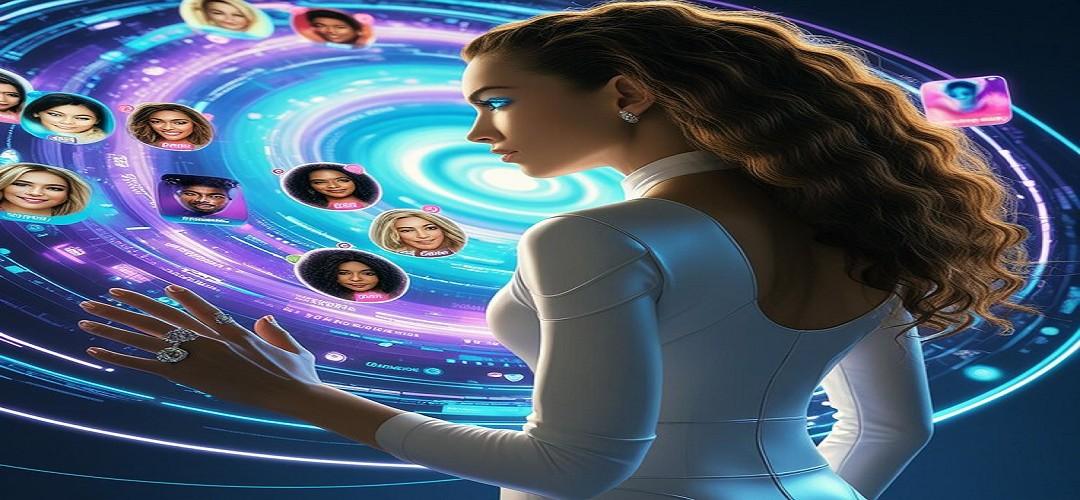
The world of influencer marketing is undergoing a dramatic transformation with the rise of AI influencers. These virtual personalities, powered by artificial intelligence, are captivating audiences, reshaping brand strategies, and blurring the lines between the real and the digital. This article explores the fascinating world of AI influencers, their impact on the marketing landscape, and the opportunities and challenges they present for brands and marketers.
What are AI Influencers?
AI influencers are digital characters created using cutting-edge artificial intelligence technologies. They often possess human-like appearances, distinct personalities, and even elaborate backstories, making them relatable and engaging to audiences. They interact with followers on social media platforms, endorse products, collaborate with brands, and even participate in virtual events, much like their human counterparts. However, unlike human influencers, AI influencers offer brands a unique set of advantages and challenges.
The Rise of AI Influencers: Why Brands are Taking Notice
Several factors are driving the growing popularity of AI influencers and their increasing adoption by brands and marketers:
-
Creative Control and Brand Safety: Brands have complete control over the AI influencer's image, message, and behavior, minimizing the risk of controversies, scandals, or inconsistencies that can sometimes arise with human influencers. This ensures brand safety and protects brand reputation.
-
Cost-Effectiveness: While the initial investment in creating an AI influencer can be significant, they can be more cost-effective in the long run compared to human influencers, who often command high fees, require ongoing management, and may have unpredictable costs associated with travel, accommodation, and other expenses.
-
24/7 Availability and Scalability: AI influencers can work tirelessly, creating content and engaging with audiences around the clock, across different time zones. They can also be easily scaled to reach different markets, demographics, and languages, expanding brand reach and impact.
-
Novelty and Engagement: The novelty and uniqueness of AI influencers can attract attention and generate engagement, especially among younger audiences who are comfortable with digital culture, virtual personalities, and the blurring of lines between the physical and digital worlds.
How AI Influencers are Changing the Marketing Landscape
AI influencers are already making waves in the marketing world, impacting various aspects of brand strategies and consumer engagement:
-
Redefining Brand Partnerships: Brands are partnering with AI influencers to promote products, launch marketing campaigns, create engaging content, and reach new audiences in innovative ways. These partnerships can range from sponsored posts and product placements to long-term collaborations, brand ambassadorships, and even virtual spokespeople.
-
Enhancing Customer Engagement: AI influencers can interact with customers in real-time, answer questions, provide personalized recommendations, and even offer customer support, creating a unique and engaging brand experience that fosters deeper connections and loyalty.
-
Driving Social Media Engagement: AI influencers can generate buzz and drive engagement on social media platforms through creative content, interactive campaigns, live Q&A sessions, and virtual events. Their ability to create consistent, high-quality content can help brands maintain an active and engaging social media presence.
-
Expanding into New Markets: AI influencers can be easily adapted to different languages and cultural contexts, making them valuable tools for brands looking to expand into new markets and reach global audiences. They can be customized to resonate with specific cultural nuances and preferences.
-
Creating Immersive Experiences: AI influencers can be integrated into virtual reality (VR) and augmented reality (AR) experiences, creating immersive and interactive brand activations that blur the lines between the physical and digital worlds. This opens up new possibilities for engaging consumers and creating memorable brand experiences.
Examples of AI Influencers Making a Mark
-
Lil Miquela: One of the most well-known AI influencers, Lil Miquela boasts millions of followers on Instagram, collaborates with major brands like Calvin Klein and Prada, and even releases her own music. She has become a cultural icon, blurring the lines between reality and virtuality.
-
Shudu Gram: Created as a digital supermodel, Shudu has worked with brands like Balmain and has been featured in major publications. Her striking appearance and fashion-forward style have captivated audiences and challenged traditional notions of beauty and representation.
-
Imma: This Japanese AI influencer is known for her realistic appearance and fashion-forward style, partnering with brands like Dior and Puma. She has become a popular figure in the Japanese fashion scene, showcasing the potential of AI influencers to connect with specific cultural audiences.
Challenges and Considerations for Brands
While AI influencers offer exciting opportunities, brands should also be aware of the challenges and ethical considerations associated with this emerging technology:
-
Authenticity and Transparency: It's crucial to be transparent with audiences about the nature of AI influencers. Clearly disclose that they are virtual entities to avoid misleading consumers and maintain trust. Transparency is key to building authentic relationships with your audience.
-
Emotional Connection: While AI influencers can simulate human-like interactions, building genuine emotional connections with audiences can be challenging. Brands need to carefully craft the AI influencer's personality and backstory to ensure they resonate with their target audience on an emotional level.
-
Ethical Concerns: The use of AI influencers raises ethical questions about representation, diversity, and the potential impact on human jobs. Brands need to be mindful of these concerns and ensure their AI influencers promote inclusivity and diversity.
-
Technological Limitations: While AI technology is rapidly advancing, there are still limitations in creating truly believable and emotionally intelligent AI influencers. As technology evolves, we can expect AI influencers to become even more sophisticated and human-like.
The Future of AI Influencers: Trends and Predictions
The future of AI influencers looks bright, with continued advancements in AI technology, growing acceptance from audiences, and increasing adoption by brands. Here are some trends and predictions for the future of AI influencers:
-
Increased Realism and Sophistication: AI influencers will become even more realistic and sophisticated, with improved natural language processing, emotional intelligence, and even the ability to generate their own content, further blurring the lines between human and virtual influencers.
-
Hyper-Personalization: AI influencers will be able to personalize their interactions with individual users, offering tailored recommendations, content, and experiences based on their interests, preferences, and past behavior. This will create more engaging and meaningful interactions with audiences.
-
Integration with the Metaverse: AI influencers will play a significant role in the metaverse, acting as virtual guides, brand ambassadors, and even companions for users as they navigate these immersive digital worlds.
-
New Revenue Models: New revenue models will emerge for AI influencers, such as virtual merchandise, paid subscriptions for exclusive content or experiences, and even virtual appearances at events, conferences, or virtual concerts.
Conclusion: Embracing the AI Influencer Revolution
AI influencers are transforming the marketing landscape, offering brands new and innovative ways to connect with audiences, build brand awareness, and drive sales. While there are challenges and ethical considerations to navigate, the potential of AI influencers is undeniable. By embracing this emerging technology, understanding its implications, and addressing the ethical concerns, brands can leverage the power of AI influencers to create engaging and impactful marketing campaigns that resonate with today's digitally savvy consumers. The future of influencer marketing is undoubtedly intertwined with the rise of AI, and brands that adapt and innovate will be well-positioned to thrive in this evolving landscape.
Published on January 1, 1970

